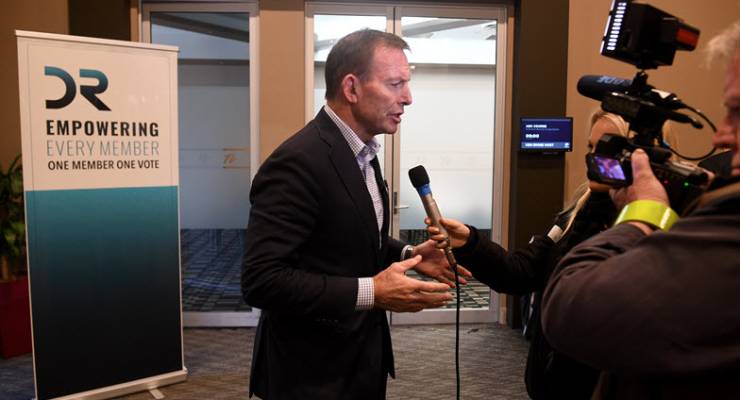
“That’s the thing about this Prime Minister,” Opposition Leader Bill Shorten said in his budget reply speech in May, “he only discovers his heart when he feels fear in it. He doesn’t believe in what he’s doing — the people behind him don’t believe it either.”
At the time it sounded like bitterness of a politician resentful that his opponent had stolen his policies. But now, Tony Abbott — in a recording obtained by Fairfax — has savaged the budget with exactly the same argument. Repeating his description of the fiscal document as “second best”, Abbott told avid listeners at a branch meeting in Liberal MP Michael Sukkar’s electorate that the government had delivered “a taxing and spending budget … Not because we believe in these things, but because the Senate made us do it. Well, a party that has to do what’s second-best because the Senate made us do it is a party which needs some help.”
It’s a cut-through version of Shorten’s exact argument — that the government can’t be believed when it says it is committed to schools funding, to Medicare, to infrastructure spending, because it simply doesn’t believe in those things. Expect to hear it repeated at the next election, regardless of who is leading the Liberals. And it was delivered in the presence of, indeed, at the invitation of, one of the ministers who helped frame the budget: Sukkar himself.
It’s true that major party MPs struggle to make branch meetings interesting for the party faithful who turn out. But there are other ways of enlivening meetings than inviting a prominent backbencher to come along and rip into your own budget and confirm the opposition’s primary attack line. Now Malcolm Turnbull is refusing to mention Abbott’s name. It’s the sort of tactic that political insiders think up that seems smart inside the Canberra bubble. One of the tactics former NSW Labor premier Bob Carr successfully used against opposition leader Kerry Chikarovski was never to mention her name; one of the errors Julia Gillard made was always seeming to be talking about Tony Abbott. In this case, though, it simply draws further attention to the problem, rather than obscures it. And just in case there was even the slightest chance of the story dying down, a Sydney Liberal Party branch is inviting a party traitor, Cory Bernardi, to address it. Imagine a Labor branch inviting Mal Colston to come and have a chat back in the 1990s. Inexplicable.
Rule one for oppositions when governments are having a meltdown is to let them get on with it. With brilliant timing, Shorten is on leave this week, holidaying domestically, giving the government all the clear air it needs to rip itself apart in public. Tanya Plibersek is acting opposition leader, but Abbott is helpfully filling in in an unofficial capacity. Shorten might even have been pleased with the Daily Telegraph — officially the country’s least trusted major newspaper — attempting to demonise him with a bizarre front-page warning of the future under Labor. This sort of propaganda didn’t even work against a more extreme figure like Jeremy Corbyn in the UK — if anything, it helped him. And given the attack involved a dystopian future in which penalty rates had been restored and the ban on same-sex marriage had been removed, it’s hard to know exactly what the Murdoch hacks thought was so awful.
Around budget time, the government looked as though it had its act together, then it proceeded to rack up a win on Gonski, and Labor looked a tad hysterical and ratty. As some pointed out at the time, however, this government always finds a way to shoot itself in the foot. It’s just that no one expected Tony Abbott to use Labor’s own attack lines to do it.








Crikey is committed to hosting lively discussions. Help us keep the conversation useful, interesting and welcoming. We aim to publish comments quickly in the interest of promoting robust conversation, but we’re a small team and we deploy filters to protect against legal risk. Occasionally your comment may be held up while we review, but we’re working as fast as we can to keep the conversation rolling.
The Crikey comment section is members-only content. Please subscribe to leave a comment.
The Crikey comment section is members-only content. Please login to leave a comment.